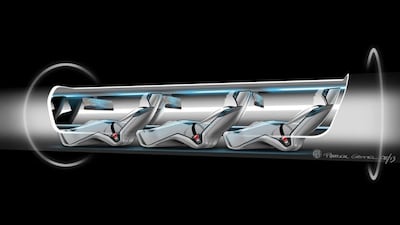The Dutch team that won this year’s edition of the competition held by entrepreneur Elon Musk’s SpaceX to develop superfast hyperloop transport technology is setting up a full-scale testing centre for the systems.
A hyperloop is a shuttle that travels on magnetic rails, somewhat like a train, but which runs in a tube with little or no air. In theory, hyperloops could allow travel faster than the speed of sound.
Alongside the Dutch efforts, the technology is also being developed separately for potential deployment in the UAE by a rival group, Hyperloop One.
“People were dreaming already of transporting humans and cargo [in hyperloops] from the 1860s, so the concept is not that new,” said Tim Houter, the co-founder of Hardt Global Mobility, the company set up to commercialise the Dutch team’s technology.
“But when Elon Musk proposed it as a transportation system between San Francisco and Los Angeles it got a huge boost” in renewed interest.
Hardt grew out of the competition team from the Technical University of Delft (TU Delft), which beat teams from MIT and the Technical University of Munich to win the all-around design and construction award in January.
With the help of several investors, among them TU Delft, the Dutch national railway NS and the construction company BAM , Hardt has built a 30 metre tube and is preparing to fit it with rails and the shuttle it has designed.
“In this facility we will test all systems that don’t require high speeds,” said Mr Houter ahead of the public opening of the test centre.
“So think about the levitation system, but also the propulsion system, but really important, all the safety systems will be tested in this low-speed but full-scale testing facility.”
Hardt has €600,000 (Dh2.4 million) in funding for the initial rounds of testing, with plans to raise more to build a high-speed test line by 2019.
Then “we’re going to test all systems that you need to test before you can actually start building a route between two cities so: top speed, taking corners, switching lanes, making it as safe as possible,” Mr Houter said.
His ambition is to break ground on a commercial hyperloop between Amsterdam and Paris by 2021.
In March, the chief executive of the company looking to bring hyperloop technology to the UAE said he was hoping to gain regulatory approval for its futuristic transportation by the end of next year.
Speaking at the Middle East Rail conference in Dubai, Rob Lloyd, the chief executive of Hyperloop One, said that the company is “learning what it will take to create the regulatory framework” required.
However, he said hoped this could be delivered and developed in the UAE first, with a view to then using it as a blueprint for operations elsewhere in the world.
Mr Lloyd claims the system could deliver passengers from Dubai International Airport to Abu Dhabi International Airport in 12 minutes.
“Our objective would be to create a playbook for regulatory approval and we are working with some of the experts around the world to do that,” he said. “We think we need to have that done in the 2018 timeframe so that we can begin construction in 2019 and go into production of Hyperloop somewhere in the region by 2020-21.”
Hyperloop One, the company co-founded by the venture capitalist Shervin Pishevar and based on an idea created by Tesla Motors and Mr Musk, is currently building a prototype of the hyperloop system north of Las Vegas in the Nevada desert.
* Agencies
business@thenational.ae
Follow The National's Business section on Twitter

